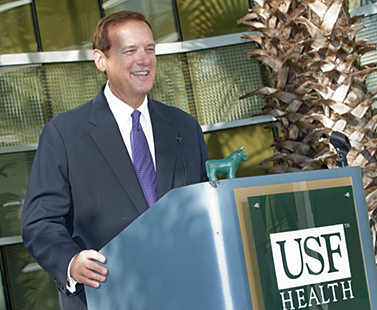Hope on horizon for Alzheimer’s patients, caregivers
Researchers at USF Health Byrd Alzheimer’s Institute highlight advances, including a new generation of drugs that may slow or reverse the underlying disease
Alzheimer’s disease drugs available today help improve symptoms for some patients, but do not stop or delay the abnormal build-up of plaques in the brain – a hallmark of the neurodegenerative disease that destroys memory.
That may be about to change.
The 98 investigational medicines for Alzheimer’s disease and related dementias, either in clinical trials or awaiting FDA review, include promising prospects that target the disease’s underlying causes. Some have shown evidence of preventing new amyloid plaques from forming in the brain, while others appear to remove plaques already there.
“Right now is one of the most exciting times to be in the field Alzheimer’s disease research,” said David Morgan, PhD, CEO and director of the USF Health Byrd Alzheimer’s Institute. “Tremendous progress has been made by academic researchers, clinicians and the biopharmaceutical industry in working to come up with solutions to this memory-robbing disease.”

Dr. David Morgan, CEO of USF Health Byrd Alzheimer’s Institute, said more research funding is critical to continue progress toward a cure.
Dr. Morgan spoke at a press conference Nov 18, during Alzheimer’s Awareness Month, attended by faculty and staff of the Byrd Alzheimer’s Institute, caregivers and representatives of advocacy groups.
The participants highlighted recent advances in Alzheimer’s drug discovery and development and new neuroimaging technologies and biomarkers that are revealing the earliest signs of Alzheimer’s disease. They also called for increased state and federal funding to continue the intensive research needed to ultimately find a cure for Alzheimer’s and other memory disorders.
While several medicines currently approved for Alzheimer’s help some patients maintain activities of daily living and remain in their homes longer, they do nothing to halt the actual disease process. “It’s like treating pneumonia with aspirin,” Dr. Morgan said. “It may break the fever and make you feel better for a little while, but the disease is still there and continues to get worse.”

Johnnie Byrd, Jr., said the Institute continues to work toward a future in which “Alzheimer’s is a memory.”
The new generation of Alzheimer’s drugs is designed to slow or reverse the underlying disease process, like antibiotics treat the cause of pneumonia, he added. In addition, the emergence of increasingly sophisticated imaging tests will revolutionize the early detection and treatment of Alzheimer’s. Positron emission tomography (PET) scans that show amyloid plaques in the living brain will soon allow doctors to more accurately predict those at greatest risk for Alzheimer’s disease five to 10 years before symptoms appear.
“We’re on the edge of new disease-modifying therapies that, if applied before symptoms appear, may prevent Alzheimer’s,” Dr. Morgan said.
The promise of new treatments is particularly important in Florida, where one in every 40 persons has Alzheimer’s disease, said Peggy Macaluso, director of client advocacy for the Alzheimer’s Association-Florida Gulf Coast Chapter.
“Educating patients and their family members about research advances can ease the tremendous fear associated with the Alzheimer’s disease,” she said. “They need to know there is help and hope for better treatment.”


Peggy Macaluso (left), of the Alzheimer’s Association-Florida Gulf Coast Chapter said that Florida is second only to California in the number of people with Alzheimer’s disease. Austin Curry (right), executive director of Elder Care Advocacy of Florida, called for support of more screening to detect Alzheimer’s earlier.
According to the Alzheimer’s Association, 5.3 million Americans live with Alzheimer’s disease at an annual cost of $172 billion for their care. That does not count the physical and emotional toll the devastating disease takes on caregivers. The National Institutes of Health currently invests $457 million a year in Alzheimer’s research, compared to $6 billion a year for cancer research and $2 billion a year for heart disease research.
One sobering fact is that nearly half of all individuals who live into their mid-80s will develop Alzheimer’s disease. More funding now is critical to stop the impending epidemic of the disease as baby boomers age, Dr. Morgan said. “A treatment breakthrough that delayed the onset of Alzheimer’s by five years would save an estimated $100 billion a year.”

Dr. Amanda Smith, medical director of the Byrd Alzheimer’s Institute, oversees 20 active clinical trials for patients with Alzheimer’s and mild cognitive impairment.
The USF Health Byrd Alzheimer’s Institute, one of the world’s largest freestanding facilities dedicated exclusively to curing Alzheimer’s disease, receives no research support from the state. The Institute provides diagnostic evaluation and treatment, comprehensive education, and supportive care for family caregivers, as well as conducting cutting-edge research in a setting where scientists and clinicians work closely together.
The Institute’s clinical center conducts 20 ongoing clinical trials to test the safety and effectiveness of treatments for people with all stages of memory loss. The trials are sponsored by well-established pharmaceutical companies and others are supported by the National Institute on Aging Alzheimer’s Disease Cooperative Study, a consortium of leading researchers throughout the U.S. and Canada.
One multicenter study is evaluating whether intravenous immune globulin (IVIg), a drug containing anti-amyloid antibodies and already FDA approved for other neurological diseases, may slow the progression of Alzheimer’s in patients with mild-to-moderate Alzheimer’s disease. Another is testing an investigational drug in patients experiencing early signs of Alzheimer’s, such as memory complaints or mild cognitive impairment.

For more information on clinical trials and other research at the Byrd Alzheimer’s Institute, call (813) 974-4355, or visit http://alz.health.usf.edu
Story by Anne DeLotto Baier and photos by Eric Younghans, USF Health Communications

